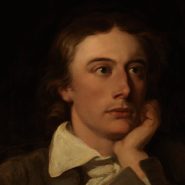By Thomas Hardy
I leant upon a coppice gate
When Frost was spectre-gray,
And Winter’s dregs made desolate
The weakening eye of day.
The tangled bine-stems scored the sky
Like strings of broken lyres,
And all mankind that haunted nigh
Had sought their household fires.
The land’s sharp features seemed to be
The Century’s corpse outleant,
His crypt the cloudy canopy,
The wind his death-lament.
The ancient pulse of germ and birth
Was shrunken hard and dry,
And every spirit upon earth
Seemed fervorless as I.
At once a voice arose among
The bleak twigs overhead
In a full-hearted evensong
Of joy illimited;
An aged thrush, frail, gaunt, and small,
In blast-beruffled plume,
Had chosen thus to fling his soul
Upon the growing gloom.
So little cause for carolings
Of such ecstatic sound
Was written on terrestrial things
Afar or nigh around,
That I could think there trembled through
His happy good-night air
Some blessed Hope, whereof he knew
And I was unaware.
Originally published in Poems of the Past and the Present (1901) by Thomas Hardy. Public domain.
Analysis
Composed at the hinge of centuries, “The Darkling Thrush” contrasts a bleak, post‑Victorian landscape with an unexpected outpouring of birdsong. Hardy’s imagery—“The Century’s corpse outleant”—casts modernity as exhausted and spiritually barren, yet the thrush’s “full‑hearted evensong” introduces a counterpoint of irrational hope.
The poem refuses easy consolation: the speaker cannot locate a cause for such joy, but he recognizes its presence. In this tension between desolation and ungrounded hope, Hardy captures the modern mood with unforgettable clarity.
